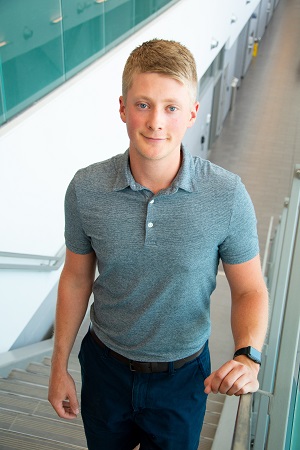Research project provides energy efficiencies for local mill and leading-edge skills for grad
Sept. 21, 2018
Samuel Cooney, recent graduate of the Mechanical Engineering Technology program, is wrapping up a research project at Georgian that’s impacting how a sawmill in cottage country operates. 
He began the project as a student through an eight-month co-op with the Centre for Applied Research and Innovation (CARI). Cooney teamed up with faculty lead Dan Brooks and Research Analyst student Alec Dare on an extensive review of Rayonier Advanced Material’s (RYAM) primary band saw operations in Huntsville.
The goal was to improve the mill’s cost base, product quality and energy efficiency.
Brooks oversaw the project and lent his technical expertise, Dare crunched numbers and provided complex data analysis, and Cooney conducted a large portion of the research.
Robert (Bob) Kelly, a professor in Engineering and Environmental Technology, also provided guidance on the project.
“Our work has resulted in multiple recommendations that could help the company increase quality, improve yield, and decrease energy consumption at their mill,” Cooney says. “It was pretty neat to do research that can have a direct impact not only on a business but the environment.”
The project was tackled in two phases — the first, evaluating the mill’s debarking process to ensure optimization in cold weather. De-barking quality decreases as temperatures dip in colder months. Cooney and the team made recommendations on how to enhance the quality of de-barked logs for processing and the wood chips sold to pulp mills.
The second phase focused on improving energy efficiency of the bandsaw and angle of its teeth. Cooney was heavily involved in this phase and redesign of the blade. He used several sophisticated analytical and design techniques to optimize the blade geometry, such as Finite Element Analysis and computerized simulation.
Cooney says a large portion of the research project dealt with topics and areas of study he hadn’t yet covered in any of his courses.
“It really gave me an edge,” he notes. “I learned a lot about the field but also tips and tricks on process improvement, and best practices for conducting and validating tests and research. I think one of the biggest things that helped was the presentation skills Dan taught me.”
Thanks to the team’s recommendations, RYAM’s head office is exploring the opportunity to roll out the project at multiple sites. They also intend to hire more of Georgian’s co-op students.
“It was really satisfying to see the synergies among needs of the company, the learning outcomes for Sam, the ability for CARI to facilitate funding contributions from various sources, and RYAM’s interest in future co-ops,” states Brooks. “The technical success of the project is a great testament to the quality of our curriculum and calibre of our graduates.”
Engineering — and Georgian — runs in Cooney’s family. His father Lorren took Civil Engineering Technology and his brother Joel took Electrical Engineering Technology.
“I came to Georgian largely because of them,” admits Cooney. “They had a great experience. The college and my program also had a solid reputation in co-op and graduate employment.”
Need help bringing your business ideas to life? Email appliedresearch@georgiancollege.ca.